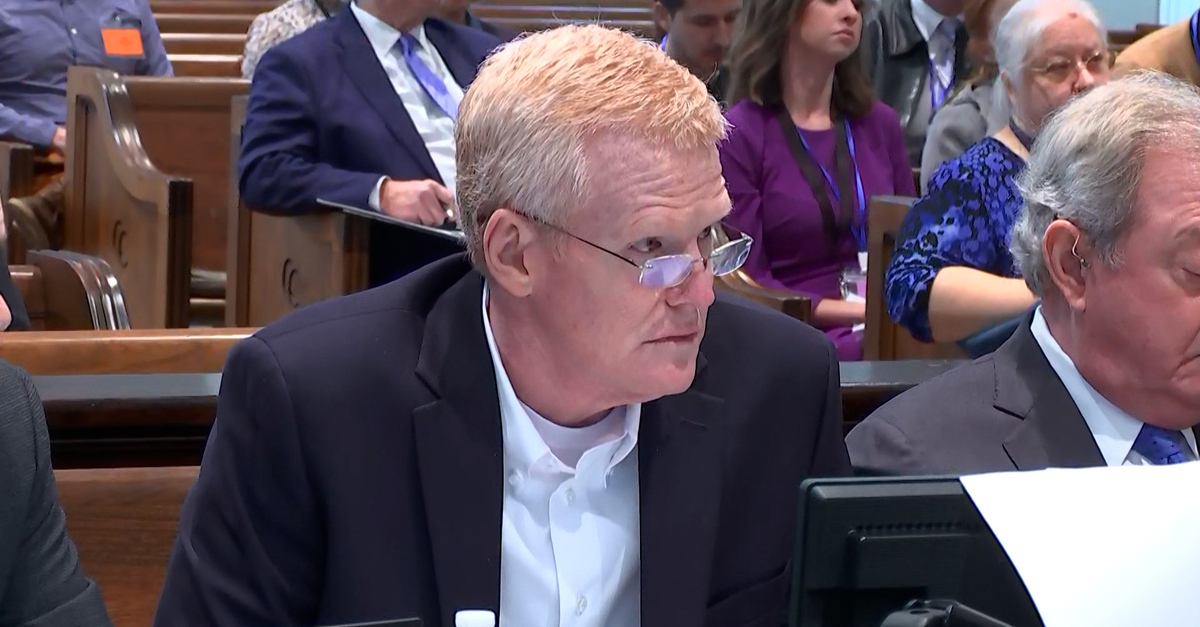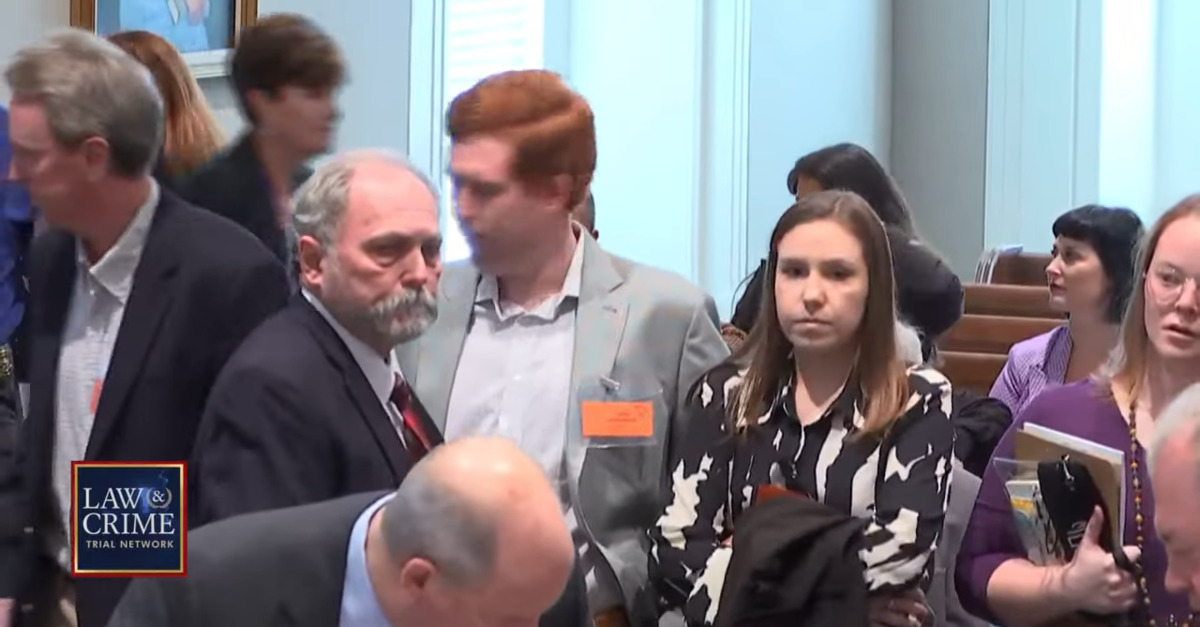
Alex Murdaugh cries as the murder of his wife and son is described by Colleton County Sheriff’s Department Sgt. Daniel Greene during testimony in Murdaugh’s double murder trial at the Colleton County Courthouse in Walterboro, S.C, Thursday, Jan. 26, 2023.
The second day of testimony in the Alex Murdaugh murder case began on Thursday morning with jurors being shown body-worn camera footage from responding officers who arrived at the Murdaugh family estate in response to the defendant’s 911 call.
Late Wednesday afternoon, defense attorney Dick Harpootlian and lead prosecutor Creighton Waters agreed that the footage, which is lengthy, would be shown in full, with the state acquiescing to that defense request after originally only planning on showing several clips from the perspective of law enforcement that grisly night in June.

Alex Murdaugh appears in court on the morning of Jan. 26, 2023.
The 54-year-old disgraced legal scion – disbarred as the murder allegations and myriad alleged financial improprieties came to light – is accused of shooting and killing his wife, Margaret “Maggie” Murdaugh, 52, and their youngest son Paul Murdaugh, 22, with an AR-style .300 Blackout rifle and shotgun, respectively.
Blood made it onto Alex Murdaugh’s white T-shirt the night of the murders; the state claims some was blood spatter; the defense claims it got there when the defendant checked his family for signs of life – but those details went unmentioned during opening arguments.
Instead, Waters promised jurors they would agree with the prosecution’s interpretation of other evidence like “crucial” cellular phone records, the body camera footage, and Alex Murdaugh’s 911 call.
The defense welcomed some of that evidence during their opening statement.
Harpootlian said the body camera footage would show his client distraught on the night of the gruesome slayings.
“I want you to hear that 911 tape,” Harpootlian added. “It is a man hysterical in grief trying to find out what’s going on.”
The state’s alleged motive for the crime – Alex Murdaugh’s impending financial ruin – is currently being hashed out beyond the reach of the jury. The defense needled the prosecution for being unable to provide jurors with a motive as the trial began.
“Why?” Harpootlian shouted out loud. “This is gonna be interesting. He doesn’t know why.”

Buster Murdaugh and his girlfriend, Brooklynn White, appear in court on Jan. 26, 2023.
On Thursday, jurors first heard from Colleton County Sheriff’s Deputy Sergeant Daniel Greene, who described body-camera footage that was only visible in the courtroom due to a defense-prosecution agreement for the court “to seal photographs and videos graphically depicting the victims.”
Waters asked the witness about part of the video shown.
“To the left was Paul’s body, he was laying face down on the ground,” the first responding officer said. “Large pool of blood around him. As well as a great deal of water that was immediately around his body.”
The prosecutor then asked to clarify where, exactly, the water was that the deputy said he saw.
“You could see walking down the kennel, the closer I got to Paul’s body, the more water there was,” Greene said.
Waters then asked the deputy if it had been raining enough that night for precipitation alone to have caused the amount of water near the deceased man’s body – prompting a quick objection from the defense that was overruled by Judge Clifton Newman. The witness was then told answer the question. Greene said he wasn’t sure how much it had been raining that night but that “it did not appear that rain had caused that water.”
The deputy then described the other body.
“On the right would be Maggie’s body, also laying face down on the ground,” he said. “Large pool of blood around her head.”
After discussing the location of a shotgun leaning against a vehicle with the deputy, Alex Murdaugh himself can be heard.
“This is a long story,” the defendant said in the body-camera footage, stammering a bit. “My son was in a boat wreck. A few – months back. He’s been getting threats. Most of it’s been benign stuff. We didn’t take serious. He’s been, like, getting punched. I know that some – I know that’s what it is.”
Waters then paused the video and interjected to ask Greene about previous testimony from earlier in the morning.
“Was that when you previously testified that he mentioned the boat case?” the prosecutor asked. “That he mentioned the boat wreck?”
“That’s correct,” Greene said. “Prior to me asking him anything about it. He did mention it.”
The deputy then asked Alex Murdaugh about when he returned to the property and if he went to the house before making his way to the dog kennels. The defendant explained that he had just left his mother’s home, that he was checking on her because she “has late-stages Alzheimer’s” and that he did go to the house first. He then offers to check his phone to provide the deputy with exact times.
“Did you check?” a dejected-sounding Alex Murdaugh asks Greene.
“Did I check what?” the deputy replies on the video.
“Did you check them?” he asks again.
“We’ve got medical guys,” Greene says. “That’s what they’re gonna do, okay?”
“What are they doing?” Alex Murdaugh asks. “Can they hurry?”

John Marvin Murdaugh and his wife Liz Murdaugh listen to opening statements in his brother Alex Murdaugh’s double murder trial at the Colleton County Courthouse in Walterboro, S.C, Wednesday, Jan. 25, 2023.
After a short break, the defense began questioning the first-responding deputy by complaining that he had never returned a series of phone calls and voicemails over the past “several weeks.”
Greene suggested that maybe Harpootlian had received the wrong number or voicemail inbox.
“But you’ve spent an extensive amount of time talking to Mr. Waters about your testimony, have you not?” the defense attorney asked.
“I’ve spoken with him a few times, yes,” the deputy said, “Three or four times. At least.”
As the cross-examination of the state’s first witness continued, Harpootlian established a theme suggesting law enforcement had failed to properly preserve evidence at the crime scene.
“There were multiple tire tracks coming and going, correct?” Harpootlian asked. “What did you do to preserve those?”
To which Greene replied: “The tire tracks? Nothing.”
The witness and the attorney both agreed that the deputy was not an expert in tire track analysis. The deputy went on to concede that he did not take pictures of the tire tracks, instruct anyone to do so, or alert state investigators about the various tire tracks in the Moselle dirt once they arrived that night. A similar back-and-forth then occurred with Greene admitting that he did not personally make any effort to preserve foot prints found at the crime scene.
“One of the cardinal rules of a crime scene is keep it pristine – don’t walk over things, try to preserve tire tracks, get pictures of footprints, all those sorts of things,” Harpootlian said near the end of the first cross-examination.
The defense asked and received an answer that Greene was the immediate supervisor of several deputies on the scene – at least until a higher-ranking law enforcement official arrived.
“Were those deputies directed by you or anyone to do anything to preserve the tire tracks, pictures, cordon ’em off, cover-up ’em up?” Harpootlian asked.
“I did not give anyone that instruction, no,” Greene replied.
Before lunch, prosecutors called Colleton County Sheriff’s Office Corporal Chad McDowell – whose job it was to secure the crime scene. During his testimony, Waters asked questions intended to suggest that the scene of the slaughter was, in fact, kept well-preserved.
“Why are there so many shell casings but only one gunshot wound to the back of each head?” McDowell can be heard musing out loud on additional body-camera footage shown to jurors. “Not my job to figure that out, but I’m just curious.”
Harpootlian took issue with McDowell walking around the crime scene as much as he did. The corporal said he admittedly was walking around and looking for shell casings on his own initiative in order to preserve evidence from the crowded crime scene.
After a recess for lunch, jurors heard from Tinish Bryson-Smith, with Hampton County Central Dispatch, followed by Angela Stallings, the administrative services dispatcher for the Colleton County Sheriff’s Office. Stallings is the 911 dispatcher who told Alex Murdaugh not to touch the bodies of the deceased. In response, the defendant said that he had already touched them both to check for signs of life.
During the dispatchers’ time on the stand, jurors also heard the full, un-redacted 911 call from the night of June 7, 2021. During that call, Alex Murdaugh explains that he’s going to grab a gun “just in case,” as well as the dispatcher urging him not to do so. The defendant also mentions that his son has been receiving threats “for months” over the 2019 boat crash that killed 19-year-old Mallory Beach.
Later, Colleton County Fire and Rescue Chief Barry McRoy testified about the gruesome scene he arrived to find at Moselle that night, describing Maggie and Paul Murdaugh’s remains in graphic terms while directing jurors’ attention to state-provided photograph exhibits.
Testimony finished on day two with prosecutors calling Colleton County Sheriff’s Office Major Jason Chapman to the stand. He responded to the double homicide that night but arrived on the scene later than many of his colleagues.
Chapman said the defendant asked him how he was doing once he arrived – which he later described as a “quip” from Alex Murdaugh. But, in something of a wash, the major said the defendant largely appeared upset as law enforcement surveyed the area.
“He was emotional, there was distress on his face, I didn’t see him cry,” Chapman said. “Not everyone cries, I don’t have an issue with that.”
[images via screengrab/Law&Crime Network; Grace Beahm Alford/The State via AP; Joshua Boucher/The State via AP]